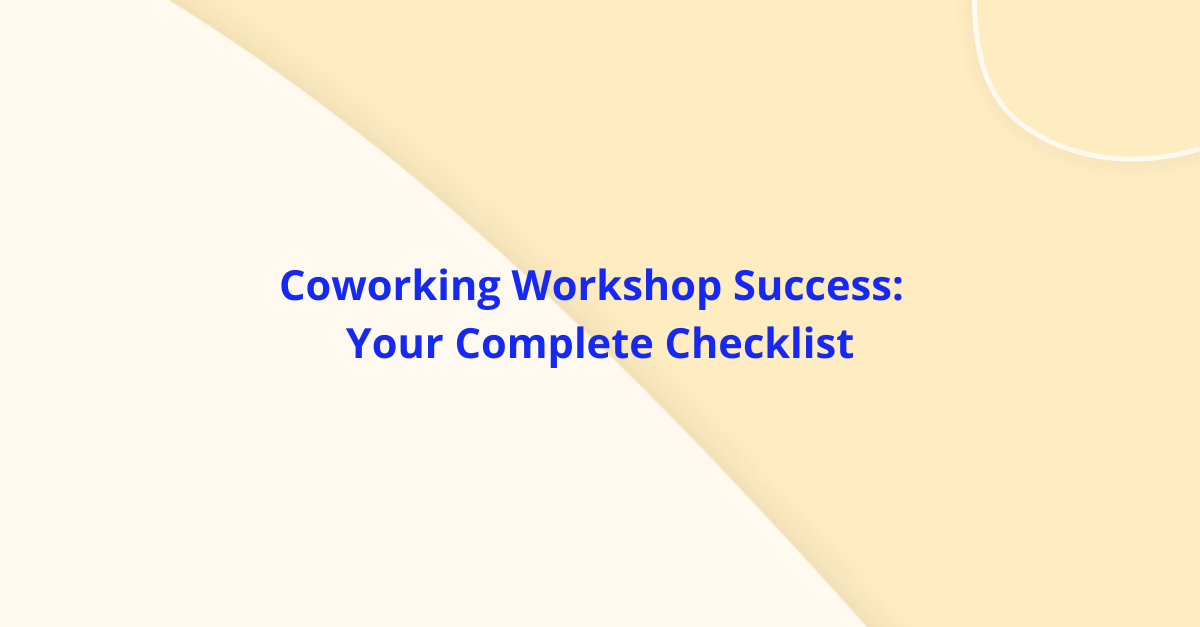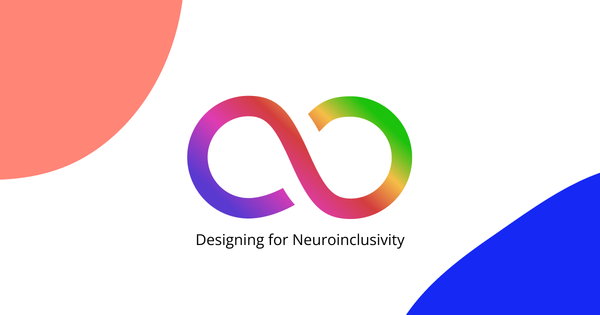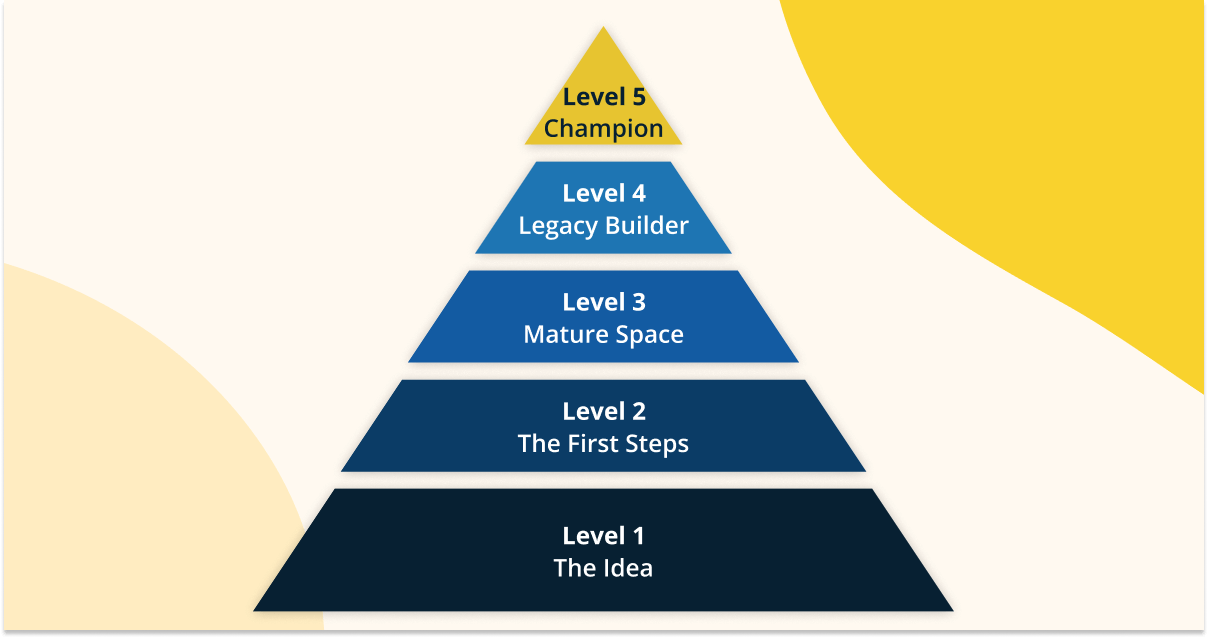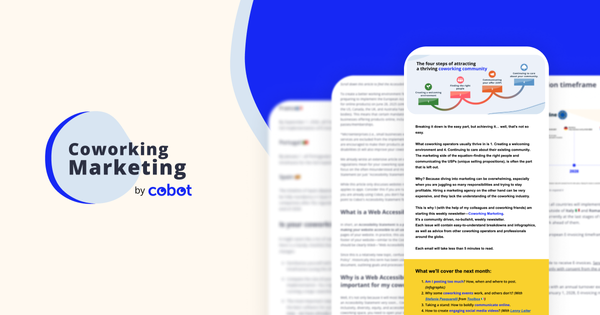Workshops are a fantastic way to engage your coworking community, provide valuable learning opportunities, and encourage creativity. Whether you’re organizing skill-building sessions or brainstorming events, these gatherings can offer immense value for participants and improve your space’s reputation.
Workshops also offer an excellent opportunity to attract potential members, impress stakeholders, and demonstrate the vibrancy of your coworking community.
At Cobot, we’ve seen coworking spaces worldwide host successful workshops, and with thoughtful planning, you can do the same. Drawing from our experiences leading workshops in diverse settings, here’s your guide to running effective workshops in your coworking space:
Key Questions To Ask Before You Start
Before diving into planning, answer some key questions that will set the foundation for a successful workshop. These will help address the needs of instructors, participants, and stakeholders involved.
For Instructors:
- When will the workshops take place, and how long will each session be?
- What materials or technology will be provided?
- How will payments be handled, and what is expected from them?
- What are the learning outcomes and expectations?
For Participants:
- How do I sign up and pay?
- Is there a free or discounted option?
- Will materials and refreshments be provided?
- Who do I talk to if I have feedback or concerns?
For Funders/Sponsors:
- How do you evaluate and select your instructors?
- What is the event budget, and how is the funding being used?
- What are the expected outcomes, and how will success be measured?
Answering these questions early helps avoid potential issues, allowing your workshops to run smoothly from day one.
Deciding on the Right Workshop Format
Not all events have to be lectures or training sessions. Interactive workshops can be highly engaging and productive. They encourage participants to work together and come up with creative ideas or solutions. If your goal is to explore a problem or generate ideas, interactive workshops are ideal.
Workshops often require additional planning, but the results—whether it’s community building or creative breakthroughs—are worth the effort.
Figuring Out Costs and Pricing
To make your workshop sustainable, it’s essential to calculate the costs involved upfront, such as rent, staff time, instructor fees, and materials. Once you know the costs, you can:
- Set a fair price: Charge enough to cover expenses while being reasonable for attendees.
- Seek external funding: Find sponsors or apply for local grants if the costs are high.
- Accept losses if necessary: If your goal is to build awareness or grow your member base, you may choose to absorb some costs.
Understanding your costs will help you price your workshops appropriately and ensure financial sustainability.
Managing Instructors, Operations, and Marketing

Once you’ve decided on your format and pricing, it’s time to plan your operations. Here's how to manage instructors, run the workshop, and market it effectively:
Before the Workshop:
- Recruit Instructors: Look for instructors who have the right expertise and understand the coworking environment. You may even find talented professionals within your coworking community. Featuring members as instructors adds value to your space and fosters stronger connections.
- Plan Content: Ensure the workshop content aligns with your members' needs. Whether it’s skill-building, creative brainstorming, or professional development, tailor the material to your community’s interests and goals.
- Set Deadlines: Establish timelines for preparing content, promoting the workshop, and finalizing logistics. Proper scheduling ensures everything runs smoothly and gives you plenty of time to attract attendees.
- Market Effectively: Leverage your coworking community by promoting the event through newsletters, social media, and in-house communication tools. Highlight how the workshop benefits members—whether by enhancing skills or offering networking opportunities.
On the Day:
- Set Up the Space: Ensure the seating, tech, and materials are ready.
- Document the Event: Capture photos or videos for future marketing and feedback.
- Wrap Up Well: Thank attendees, gather immediate feedback, and leave a positive impression.
After the Workshop:
- Analyze Feedback: Look at what participants liked, what could be improved, and how they heard about your workshop. This information is invaluable for future events.
- Follow Up: Send thank-you emails, share photos, and keep the conversation going.
Designing Workshops for Accessibility and Inclusivity
A successful workshop is one where every participant feels included and can engage fully. Here’s how to ensure that happens:
- Provide Clear Information: Let attendees know the language of the workshop, any special requirements, and accessibility options, like wheelchair access.
- Offer Scholarships: Providing free or discounted access makes workshops more inclusive and attracts a wider range of participants.
- Use a Code of Conduct: Ensure respectful behavior with a clear code of conduct that staff and attendees understand. Here’s an example from our former space.
Handling Instructors and No-Shows
You’ll need clear policies for hiring and managing instructors. How will you pick them? How will you pay them? Have these answers ready to ensure smooth collaborations.
Also, prepare for the unexpected. What happens if an instructor cancels last minute? Having a backup plan will save you from scrambling. Whether you find a replacement or reschedule, a solid plan protects your staff and keeps your event professional.
Keeping Workshops Engaging
Workshops should be interactive and engaging. Try to incorporate activities like:
- Brainstorming Games: Encourage group collaboration with visual and fun elements to generate fresh ideas. In a coworking environment, participants from diverse industries can offer unique perspectives, sparking creative solutions.
- Hands-On Exercises: Let participants try things out and come up with real solutions. Whether it's coding, marketing strategies, or design thinking, practical activities help members leave with actionable skills.
- Creative Silence: Give participants time to think individually before collaborating. This ensures that different work styles are accommodated, making conversations more inclusive and thoughtful.
Brief your facilitators ahead of time so they can guide discussions and activities smoothly.
The Logistics of Running a Workshop
Even the best content can be overshadowed by poor logistics. Here are some logistical considerations:
- Room Setup: Arrange tables for group activities, provide materials like flip charts, and ensure a screen for presentations.
- Refreshments: Snacks and drinks keep participants energized.
- Recording Outcomes: Take photos of workshop outputs, capture video summaries, and collect all notes to avoid losing valuable ideas.
Final Advice
Running workshops takes planning and effort, but the rewards—stronger community ties, valuable knowledge sharing, and lasting impressions—are well worth it. Workshops help build connections, generate new ideas, and contribute to the growth of your coworking space.
With Cobot’s tools and careful planning, your workshops can become an integral part of your community and a highlight of your coworking space’s offerings.
Ready to run some workshops in your own coworking space? Cobot can help. We’ve got some great features specifically for events and workshops, including our Events add-on, External Bookings, and Google Calendar Sync integration.
If you haven’t already signed up, give us a go with a free trial or a live demo. You’ll find that our features can help you run your coworking space more effectively and grow your community. And if you have questions, our support team is all ears!
Happy Coworking!



